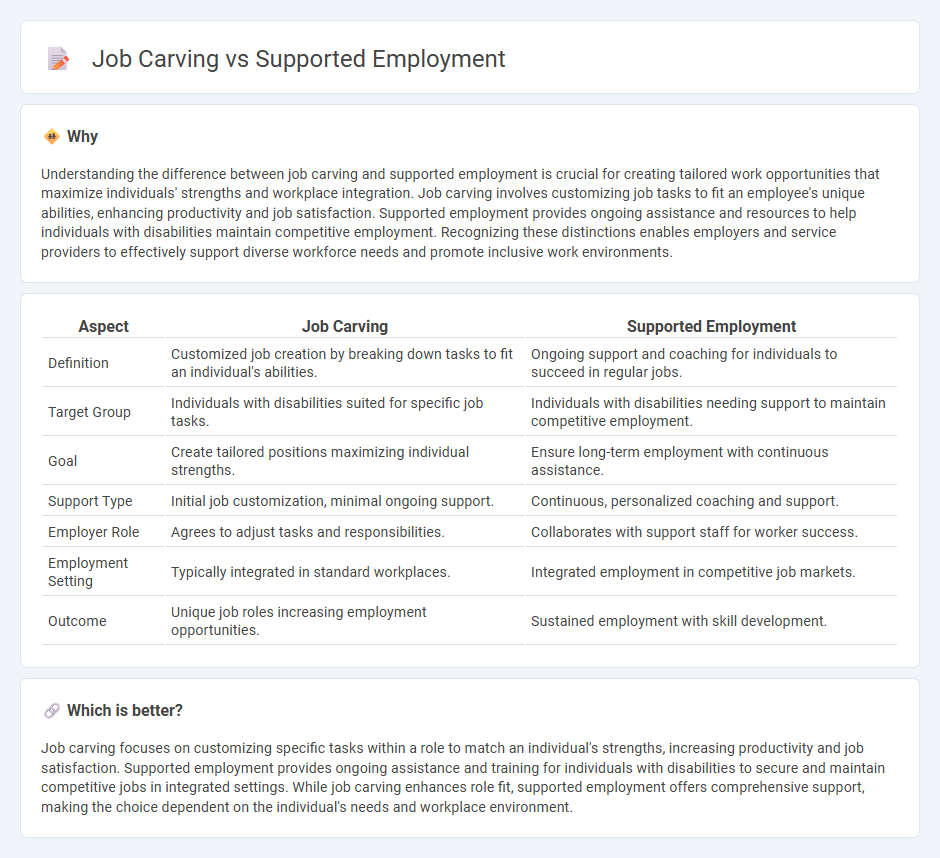
Job carving customizes roles by breaking down tasks to fit an individual's specific skills, enhancing productivity and job satisfaction. Supported employment integrates ongoing support services, such as job coaching and workplace accommodations, to help people with disabilities maintain competitive jobs. Explore detailed comparisons to understand which approach best suits diverse workforce needs.
Why it is important
Understanding the difference between job carving and supported employment is crucial for creating tailored work opportunities that maximize individuals' strengths and workplace integration. Job carving involves customizing job tasks to fit an employee's unique abilities, enhancing productivity and job satisfaction. Supported employment provides ongoing assistance and resources to help individuals with disabilities maintain competitive employment. Recognizing these distinctions enables employers and service providers to effectively support diverse workforce needs and promote inclusive work environments.
Comparison Table
| Aspect | Job Carving | Supported Employment |
|---|---|---|
| Definition | Customized job creation by breaking down tasks to fit an individual's abilities. | Ongoing support and coaching for individuals to succeed in regular jobs. |
| Target Group | Individuals with disabilities suited for specific job tasks. | Individuals with disabilities needing support to maintain competitive employment. |
| Goal | Create tailored positions maximizing individual strengths. | Ensure long-term employment with continuous assistance. |
| Support Type | Initial job customization, minimal ongoing support. | Continuous, personalized coaching and support. |
| Employer Role | Agrees to adjust tasks and responsibilities. | Collaborates with support staff for worker success. |
| Employment Setting | Typically integrated in standard workplaces. | Integrated employment in competitive job markets. |
| Outcome | Unique job roles increasing employment opportunities. | Sustained employment with skill development. |
Which is better?
Job carving focuses on customizing specific tasks within a role to match an individual's strengths, increasing productivity and job satisfaction. Supported employment provides ongoing assistance and training for individuals with disabilities to secure and maintain competitive jobs in integrated settings. While job carving enhances role fit, supported employment offers comprehensive support, making the choice dependent on the individual's needs and workplace environment.
Connection
Job carving customizes work tasks to match an individual's strengths, facilitating supported employment by creating tailored roles for people with disabilities. Supported employment promotes inclusive workplaces by integrating carved positions that enhance productivity and employee satisfaction. Both strategies collaborate to increase job retention and improve career opportunities for individuals facing employment barriers.
Key Terms
Individual Placement and Support (IPS)
Individual Placement and Support (IPS) emphasizes rapid job placement for individuals with mental health conditions by integrating employment services with mental health treatment, whereas supported employment broadly includes ongoing job coaching and support. Job carving customizes existing job duties to match a person's skills, promoting job satisfaction and sustainability within IPS frameworks. Discover how these tailored approaches improve employment outcomes for people with disabilities and mental health challenges.
Customized Employment
Customized Employment encompasses both supported employment and job carving by tailoring job responsibilities to fit an individual's strengths and needs. Supported employment integrates ongoing support services to help individuals maintain competitive jobs, while job carving restructures existing job tasks to create personalized roles. Explore how customized employment strategies enhance workforce inclusion and productivity.
Reasonable Accommodation
Supported employment emphasizes tailored assistance to help individuals with disabilities maintain competitive jobs, integrating Reasonable Accommodations such as modified schedules or assistive technologies. Job carving involves reshaping specific job tasks to match a person's strengths, reducing barriers by adjusting roles without altering the overall work environment. Explore detailed strategies to optimize workplace inclusivity through Reasonable Accommodation.
Source and External Links
Supported Employment - Supported employment involves competitive employment in integrated settings with ongoing support services for individuals with significant disabilities, ensuring they can maintain work despite their conditions.
Supported Employment - This service increases opportunities for individuals needing additional support to work in real jobs for competitive wages, using job coaching and advocacy to facilitate employment.
Supported Employment - CVR - This program provides services to help individuals with special needs gain and maintain community employment through personalized coaching and support.
 dowidth.com
dowidth.com